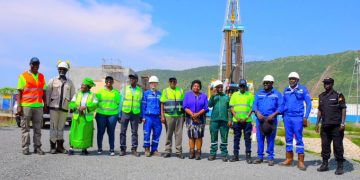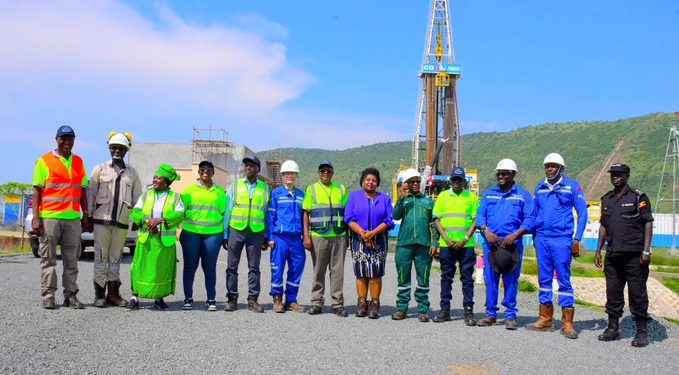Albertine Region – The 9th Board of Directors of the National Environment Management Authority (NEMA) has concluded a four-day environmental monitoring mission across the Albertine Graben and Luwero regions, pledging tougher oversight to ensure compliance with environmental standards as Uganda edges closer to its first oil production.
The mission, the first since the Board’s inauguration in March, covered strategic projects including the Kingfisher Development Area (KFDA), Tilenga oil fields, Kabalega Industrial Park, Kabalega International Airport, Victoria Sugar Ltd, Kinyara Sugar Ltd, Bwendero Dairy Farm Ltd, and urban centres in Buliisa and Hoima.
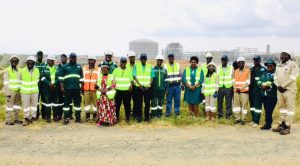
The exercise was intended to gain firsthand insight into project operations, verify compliance with Environmental and Social Impact Assessment (ESIA) conditions, and address emerging socio-economic and ecological concerns.
Oil Projects Near Completion
At the Kingfisher Development Area, operated by CNOOC Uganda, the Board commended the company for adopting low-carbon technologies, developing a robust oil spill response plan, and aligning its Environmental, Social, and Governance (ESG) strategy with international standards.
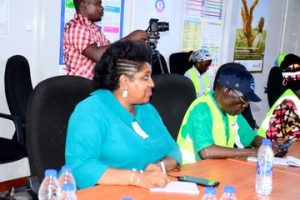
Standing in for the 9th NEMA Board Chairperson, Dr Calist Tindimuguya, inquired about the timeline for Uganda’s first oil barrel. CNOOC reported the project is 95% complete, with all stimulations done.
CNOOC also confirmed Uganda’s readiness for oil production with an Oil Spill Contingency Plan and measures to protect water quality and biodiversity, given the site’s sensitive ecological setting.
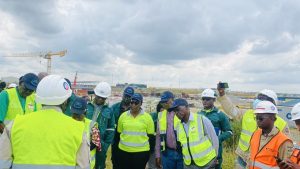
At the Tilenga Project operated by TotalEnergies, the Board inspected well pads, water abstraction systems, and waste management facilities. The Tilenga Project has established 28 well pads to date, with four currently active and undergoing oil extraction.
Infrastructure Projects Take Shape
At Kabalega Industrial Park, the Board was informed by the Uganda National Oil Company (UNOC) that infrastructure works—including wastewater treatment plants, power reticulation, and perimeter fencing—are 98 percent complete.
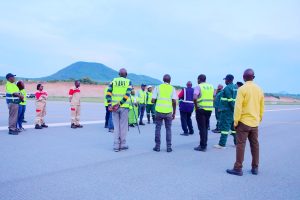
According to the Uganda National Oil Company (UNOC), infrastructure development—including wastewater treatment, fencing, and power reticulation—is 98% complete, with investor onboarding currently underway. Kabalega Industrial Park is set to become the largest of its kind in Africa.
The inspection also extended to Kabalega International Airport, where SBC Uganda Ltd confirmed the facility can now handle two Antonov cargo aircraft landing simultaneously.

Board members concluded the visit with a tree-planting exercise aimed at offsetting future carbon emissions through carbon credit programs.
“It’s encouraging to see growing awareness that industrial growth must align with environmental protection. In essence, pursue a balance that reflects the triple bottom line – people, planet, and profit. That means using our natural resources sustainably to benefit both current and future generations. Here’s to greening Uganda,” said Kagingo, as she planted a tree at the Kingfisher oil project site operated by CNOOC in Hoima District.
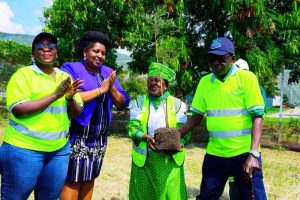
Sugar Sector Praised but Urged to Do More
The monitoring team also visited Victoria Sugar Ltd and Kinyara Sugar Ltd to assess compliance with pollution control, waste management, and circular economy integration.
At Kinyara, the Board inspected the distillery, sugar refinery, bio-fertilizer plant, and effluent treatment systems. The company was applauded for pioneering bio-pesticides and bio-fertilizers as alternatives to inorganic chemicals.
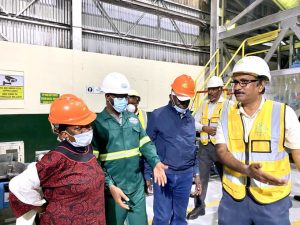
Victoria Sugar Ltd also received praise for pollution prevention efforts but was urged to accelerate implementation of outstanding safeguards.
“NEMA now offers free Compliance Assistance services to help industries meet these requirements. We advise companies to make use of this opportunity,” NEMA Executive Director Dr. Barirega Akankwasah announced.
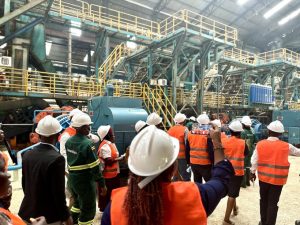
Urban and District Leaders Raise Concerns
In Buliisa District, leaders raised alarms over flash floods and human settlements in flood plains.
The Board directed local authorities to form a flood emergency team and intensify sensitization campaigns.

In Hoima City, leaders cited wetlands degradation, a nearly full Kibaati landfill, and rising noise pollution as pressing concerns, especially around the newly built Kabalega Stadium.
Dr Tindimugaya advised the city to intensify public education efforts to foster appreciation for wetlands. He also recommended a dual approach—technical and political—to effectively demarcate and protect wetland boundaries.

Dr Barirega urged the city to prioritise environmental management during budget planning. He referenced the National Environment Act Cap. 181, which decentralises environmental responsibility and places the onus of waste management on the waste generator.
Board Pledges Tougher Oversight
NEMA board commended Bwendero Farms Limited for the technology of carbon dioxide capture and storage to manufacture drinks, which helps in carbon emissions reduction, however, cautioned on discharge and to ensure proper effluent treatment. NEMA pledged to support the farm in compliance.

Concluding the mission, the Board pledged stricter enforcement to balance development with environmental protection. The Board promised quarterly inspections across all high-impact projects in the Albertine Graben and other regions.
The four-day mission covered projects in Masindi, Buliisa, Hoima, Luwero, and Kikuube districts, marking a new era of proactive environmental governance under the 9th NEMA Board.

